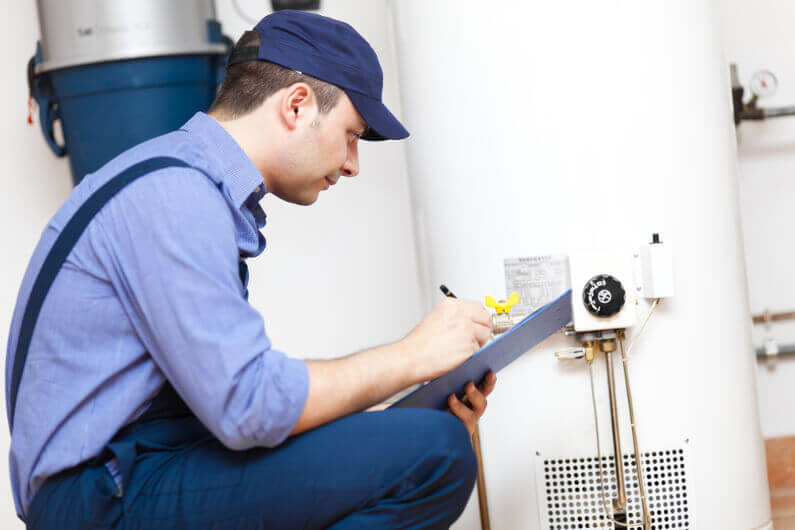5 indications your Hot Water Heating System is Dying
5 indications your Hot Water Heating System is Dying
Blog Article
The article author is making a few good annotation regarding Telltale Signs That It’s Time for a New Hot Water Heater as a whole in this article down below.

Often, the lag in your heater is simply an outcome of showering too much or doing lots of laundry. However, there are circumstances when your tools needs fixing so you can proceed taking pleasure in hot water. Do not wait on broken hot water heater to give you a large migraine at the peak of winter.
Rather, learn the indication that suggest your water heater gets on its last leg before it entirely conks out. Call your plumber to do repair work prior to your maker totally stops working and leakages everywhere when you observe these six red flags.
Experiencing Variations in Temperature
Your water heating system has a thermostat, and the water created must remain around that same temperature you establish for the device. If your water becomes too hot or as well cool all of an unexpected, it can suggest that your water heater thermostat is no longer doing its task.
Making Insufficient Warm Water
If there is not nearly enough hot water for you and your household, yet you have not altered your intake behaviors, then that's the sign that your water heater is failing. Typically, growing households as well as an extra shower room show that you need to scale approximately a bigger device to fulfill your needs.
When everything is the same, but your water heater suddenly does not fulfill your warm water demands, take into consideration an expert assessment since your device is not carrying out to standard.
Seeing Leakages and also Pools
Check to ports, screws, and pipelines when you see a water leak. You may simply need to tighten several of them. If you see puddles collected at the base of the heating device, you should call for an immediate assessment because it reveals you've got an energetic leak that can be a problem with your container itself or the pipes.
Listening To Odd Sounds
When uncommon sounds like touching and knocking on your equipment, this suggests sediment accumulation. It is akin to stratified rocks, which are hard as well as make a lot of sound when banging against steel. If left unattended, these items can create splits on the steel, triggering leakages.
Thankfully, you can still conserve your water heater by draining it and also cleaning it. Just take care because taking care of this is dangerous, whether it is a gas or electric device. Wear safety glasses, gloves, as well as safety clothes. Most importantly, make sure you understand what you're doing. Or else, it is better to call an expert.
Seeing Cloudy or Smelly Water
Does your water unexpectedly have an odor like rotten eggs and look filthy? If you scent something weird, your water heater might be acting up.
Aging Past Standard Life Expectancy
If your hot water heater is greater than ten years old, you should take into consideration changing it. That's the all-natural life-span of this machine! With proper maintenance, you can extend it for a few more years. In contrast, without a routine tune-up, the lifespan can be shorter. You may think about water heater replacement if you understand your water heater is old, combined with the other issues discussed above.
Don't wait for broken water heaters to give you a big headache at the top of winter.
Your water heating system has a thermostat, and also the water generated must stay around that same temperature you establish for the device. If your water comes to be as well hot or too cool all of an abrupt, it can indicate that your water heating unit thermostat is no much longer doing its task. If your water heating unit is more than 10 years old, you need to think about replacing it. You might take into consideration water heating unit substitute if you recognize your water heating unit is old, combined with the other issues stated over.
Recognizing the Signs of a Damaged Water Heater
Winter may be mostly behind us but having hot water in our homes is a necessity year-round. A broken water heater can be a time-consuming and costly problem.
Recognizing the signs of a water heater in distress, and knowing what to do about it, is the best way to avoid a full-blown water heater "meltdown."
Sediment buildup, rust, and high water pressure are some of the most common causes of water heater failure. Improper installation or equipment sizing are other commonly found issues. A leak can occur near the supply line which can cause damage to dry wall or flooring.
Like any appliance, frequent checks can prevent your water heater from becoming a big problem. Try to set an annual reminder to check for water pooling around your water heater and to tighten any loose fittings you might find. The quicker the issue is resolved, the less damage it will cause in the end.
If you do find signs that your water heater is broken or about to burst, the first thing to do is to shut it off. For gas water heaters, twist the dial at the top of the thermostat from ON to OFF. If it’s an electric heater, switch the circuit breaker to OFF.
Once the water heater is turned off follow these steps:
Turn off the water supply. Completely drain the water heater. Open the pressure relief valve. Rinse the water heater with cold water when the unit has finished draining. https://armstrongcomfort.com/Blog/things-that-can-cause-your-water-heater-to-break

I hope you liked our post on When Should You Replace Your Hot Water Heater?. Thanks for taking the time to read through our piece of content. So long as you enjoyed our post kindly make sure you remember to share it. Bless you for your time. Come back soon.
Book Services
Report this page